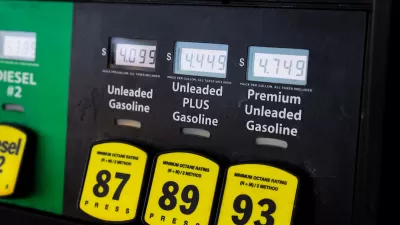It's 1973 again in 12 counties - this time Hurricane Sandy, rather than OPEC, is to blame. For those carrying gas cans rather than driving (or pushing) cars to the stations, they're exempt. The military and FEMA will deliver more fuel to NY and NJ.
For those old enough to remember, President Nixon instituted price controls and rationing as a result of long gas lines stemming from the Arab oil embargo. Gov. Chris Christi, citing "the long lines and otherwise disorderly sales of fuel following Hurricane Sandy", took similar action on Nov. 02 by signing "an executive order [PDF]...announcing a state of energy emergency and instituting gas rationing for the purchase of fuel by motorists in 12 counties, starting Saturday, Nov. 03 at noon."
Gov. Christie called "the fuel supply in the state a 'shortage' that could endanger public health, safety and welfare, the rationing will take place in Bergen, Essex, Hudson, Hunterdon, Middlesex, Morris, Monmouth, Passaic, Somerset, Sussex, Union and Warren counties."
"According to the order, all retail gasoline dealers are required to sell fuel for use in a passenger vehicle according to the last number appearing on a vehicle's license plate.
- Vehicles with license plates, the last number of which is an odd number, can fill up at stations in these counties only on odd-numbered days of the month, the order said.
- Vehicles with license plates, the last number of which is an even number, can fill up only on even-numbered days." (Zero is treated as even number)
Winnie Hu writes in the The New York Times that New York Harbor, which had been closed due to Hurricane Sandy, "was partly reopened to ships on Thursday (Nov. 01). To help move gasoline faster to customers, (NY Gov. Andrew) Cuomo said he was waiving a requirement that fuel tankers docking in New York register and pay a tax before unloading."
President Obama also addressed the fuel shortage. Writing in the The New York Times, Eric Lipton and Clifford Krauss report that in response to "panic buying by the public...the Defense Department (will) send 24 million gallons of fuel to the region".
The military will go beyond supplying gas stations with fuel. The northeast remains dependent on heating oil as well.
"The Pentagon has also been authorized by the Energy Department and the White House to tap the Northeast Home Heating Oil Reserve. It will draw as much as two million gallons of diesel fuel - part of the 12 million total - for government emergency responders, helping them to keep electricity generators, water pumps, federal buildings, trucks and other vehicles running. The oil reserve, created by the federal government in 2000, holds 42 million gallons of ultralow-sulfur diesel at terminals in Groton, Conn., and Revere, Mass. It is the first time fuel has been released from the reserve."
The West Coast would have benefited from such a reserve in its recent shortage of gasoline resulting from refinery and distribution break-downs. While some gas stations voluntarily closed down, most stations adjusted their prices accordingly, resulting in a 50 cent price increase the first week of October.
Raising prices in times of shortage was explored by NPR on Nov. 02 in "Some Economists Think Price Gouging Is Good". In fact, some "experts contend it was price controls, not a spike in oil and gas prices, that prompted rationing and gasoline shortages" in the 1970s writes CNN/Money's Chris Isidore on October 13, 2004.
Thanks to Peter Flieg
FULL STORY: Gov. Christie signs order to ration gas in 12 N.J. counties

Planetizen Federal Action Tracker
A weekly monitor of how Trump’s orders and actions are impacting planners and planning in America.

Map: Where Senate Republicans Want to Sell Your Public Lands
For public land advocates, the Senate Republicans’ proposal to sell millions of acres of public land in the West is “the biggest fight of their careers.”

Restaurant Patios Were a Pandemic Win — Why Were They so Hard to Keep?
Social distancing requirements and changes in travel patterns prompted cities to pilot new uses for street and sidewalk space. Then it got complicated.

Albuquerque Route 66 Motels Become Affordable Housing
A $4 million city fund is incentivizing developers to breathe new life into derelict midcentury motels.

DC Area County Eliminates Bus Fares
Montgomery County joins a growing trend of making transit free.

Platform Pilsner: Vancouver Transit Agency Releases... a Beer?
TransLink will receive a portion of every sale of the four-pack.
Urban Design for Planners 1: Software Tools
This six-course series explores essential urban design concepts using open source software and equips planners with the tools they need to participate fully in the urban design process.
Planning for Universal Design
Learn the tools for implementing Universal Design in planning regulations.
Heyer Gruel & Associates PA
JM Goldson LLC
Custer County Colorado
City of Camden Redevelopment Agency
City of Astoria
Transportation Research & Education Center (TREC) at Portland State University
Camden Redevelopment Agency
City of Claremont
Municipality of Princeton (NJ)




























